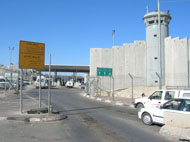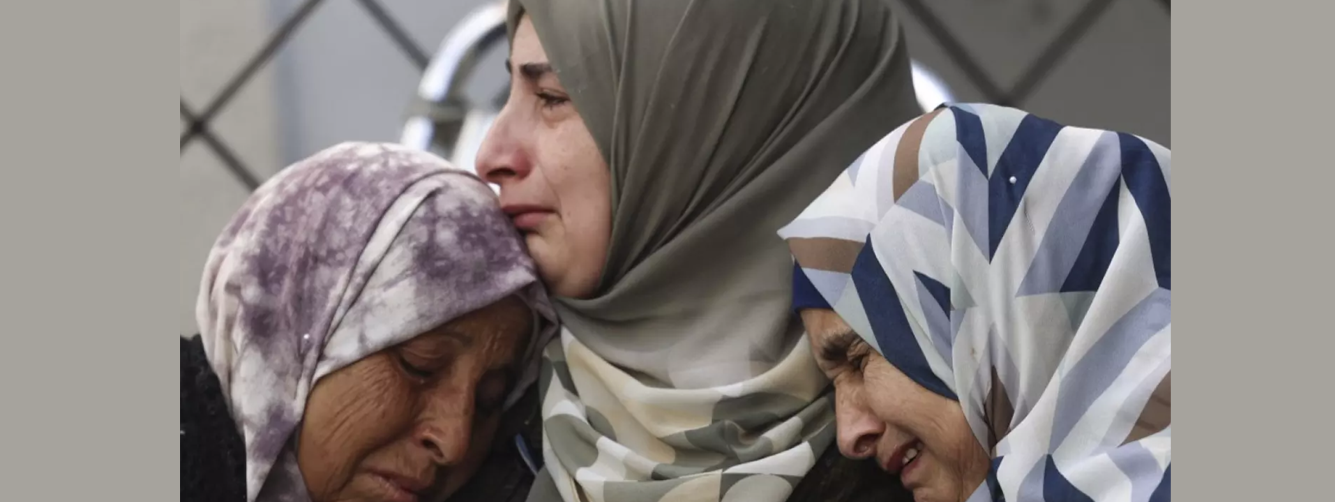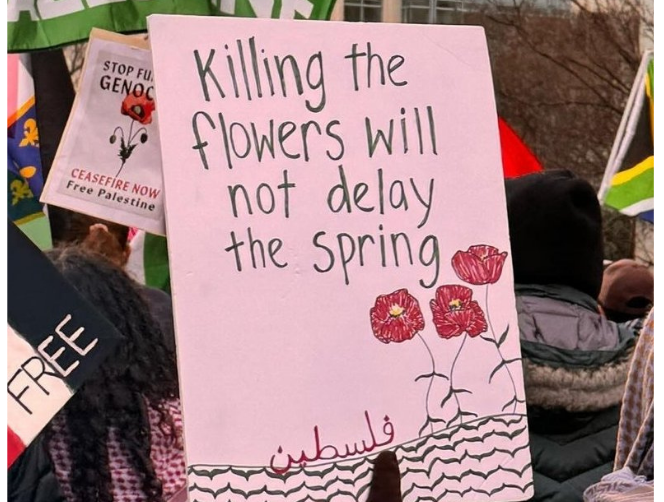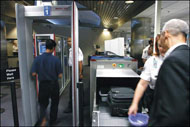
I pass through the Qalandia checkpoint a lot. The infamous crossing cuts off the main rout from where I work in Ramallah to where I live in Jerusalem. Israelis say its purpose is to keep "terrorists" out, but years after the last so-called terrorist crossed from the West Bank, Israel still keeps Jerusalem completely isolated from West Bank Palestinians who cannot cross unless they receive a rarely-granted permit. Going into Ramallah is simple; there is usually no inspection on the way in, only the occasional traffic jam since the road is not designed to handle the tens of thousands of cars that pass through.
The time it takes varies by the traffic and whether they’ve opened one or two of the motor inspection gates (I’ve never seen them open the third, even on the Eid holiday). I’m used to the routine: fight your way to the front of a crowd of idling cars, turn off the headlights as you approach the three Israeli army guards, pull up after they wave you over, get out to open the trunk and hand over your ID to the usually-teenage-looking officer. If the inspection satisfies the soldiers, that’s it.
And if you forgot, this process is repeated for the thousands of vehicles that cross daily, mostly Palestinian-Israelis or residents of Jerusalem along with a smattering of commercial trucks. The mind numbing boredom these guards must suffer mixed with the constant unpleasant task of invading people’s privacy leads to generally less-than-cordial attitude.
Most of the time I cross alone in my car and the process really isn’t all that difficult, a daily inconvenience that makes a 15 minute trip take 30 to 45 minutes or more. Sometimes I take people across, and up until two days ago the soldiers never had a problem with it.
Returning to Jerusalem with a friend in the passenger seat early that evening, the traffic wasn’t that bad. We only had to wait five minutes to reach the inspection. I followed the normal procedure, headlights, pull up, trunk, ID and everything seemed to be in order. Sometimes the guards ask for the passenger’s IDs, sometimes they don’t care, especially when they see an American passport; it’s a general rule that unless they ask for something, don’t bother to volunteer for extra inspection.
Yet as I got back in the car, the soldier could hear my passenger speaking Arabic on the phone and came to the window and asked for her ID as well. As she fumbled around for it and tried to continue her conversation it fell on her lap as the guard reached in. The soldier screwed up her face and held her hand out feigning impatience at such an insulting mistake. When she looked over the ID, she asked if we were related and told us that for the past three years, the rule has been only nuclear family is allowed to accompany the driver across the checkpoint in a vehicle. Non-relatives have to get out and walk the 300-meter foot path through the crossing, go through the cage-like corral, and take orders from the Hebrew coming over the loudspeaker. There is no direct interaction between the soldiers and the Palestinians in the crossing who are always separated by metal bars or bulletproof glass.
It was the first we had heard of such a rule and when we explained that we had both been through the checkpoint in exactly the same circumstances before, she said nothing to counter it. My friend had to get out and walk through. I could wait for her on the other side. Fifteen minutes later, after waiting in line again, getting her bag scanned, walking through a metal detector, and waiting for the guard to stop laughing on the phone, she emerged on the other side.
The arbitrary enforcement of laws is a universal aspect of military rule of civilian populations. With little to no oversight and no accountability (there is no hotline for Palestinians to report abuse to) soldiers serving in the occupied Palestinian territories are given a huge level of autonomy. Officially they are expected to act according to “lofty values” as the Israeli Air Force commander put it, no matter how much they operate with impunity.
Israeli Jews tend to use the phrase “The most moral army in the world” to refer to their military, but how can a force that has been occupying another people for more than 40 years keep itself from forgetting its morals? Over time, under stress, it is simply easier to control people when you dehumanize, abuse and manhandle them than it is to treat them with dignity which requires you respect their rights and freedoms.
The Israeli ethics manual, in use since at least 2005, places the lives and wellbeing of its soldiers above that of civilian noncombatants who are “not under state control”. The phraseology is vague enough to be open to various interpretations when you apply it to reality. Are the Palestinians in Gaza under Israeli control? Gazans are certainly at Israel’s mercy when it comes to their livelihoods and Israeli bombs. What about the West Bank, which is divided into areas of Palestinian Authority, Israeli and mixed jurisdiction?
Clearly it is in the interest of Israeli soldiers to interpret the occupied territories as outside state control, and if they have the leeway to consider their lives more valuable than the populations they operate in why wouldn’t they? Ironically, the Israeli interpretation is flexible. When it comes to building on occupied territory, Israelis emphatically claim the West Bank to be “disputed” at best, or Judea and Samaria at worst.
Applying it to the occupation and recent Israeli military operations it’s clear that when it comes to confronting Palestinians the Israeli military is only concerned with the lives of its own. This develops a culture of dehumanization and impunity and leads to the arbitrary enforcement, racial profiling, humiliation and degradation Palestinians feel daily. When one people rules over another with complete authority and almost no accountability, that power will almost invariably be abused.
Obviously, not every soldier memorized the ethical manual and applies it to every action they take in enforcing the occupation. In fact it probably was just handed to them during basic training and got lost in a drawer or backpack. Yet Israeli army behavior shows that even if they had studied the manual and deeply internalized the principles within, many of the crimes and abuses Palestinians suffer at the hands of the occupation could be justified under it.
The fact that this code was studied and approved by Israel’s top military commanders shows that the few soldiers who are caught and court marshaled for breaking Israeli rules of engagement are not just a few bad apples. Instead it looks more like a rotten barrel.
Michael Khaled is a Writer for the Media and Information Department at the Palestinian Initiative for the Promotion of Global Dialogue and Democracy (MIFTAH). He can be contacted at mid@miftah.org.










